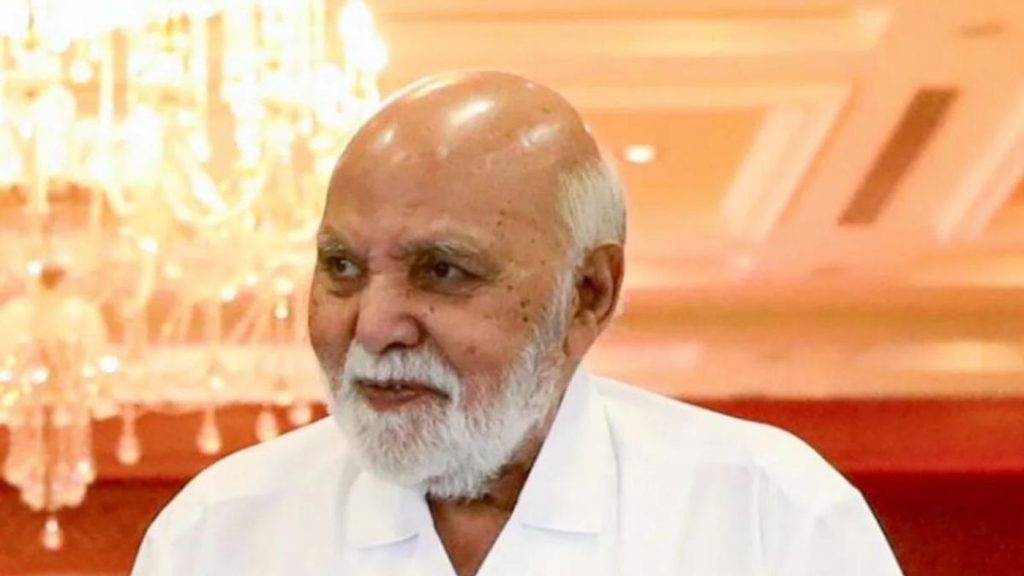Ramoji Rao, a remarkable figure who changed the media industry, passed away in Hyderabad at the age of 87. His influence on the political and social landscape of Andhra Pradesh over the last fifty years is significant.
A Life of Achievements
Rao was a media baron and business tycoon, involved in various fields like media, films, hospitality, food, and retail. In 2016, he received the Padma Bhushan, India’s second-highest civilian award, for his contributions to journalism, literature, and education.

Building an Empire
Rao founded many successful businesses:
- Eenadu Newspaper: The largest Telugu daily newspaper.
- ETV Channels: A popular network of TV channels.
- Ramoji Film City: The world’s largest film city.
- Dolphin Group of Hotels
- Margadarsi Chit Fund
- Ushakiran Movies: A film production company.
- Priya Foods
These businesses provided thousands of jobs and continue to impact millions of lives in Andhra Pradesh, Telangana, and beyond.
Tributes from Leaders
Many leaders paid tribute to Rao. President Droupadi Murmu called him an “innovative entrepreneur.” Prime Minister Narendra Modi described him as a “visionary who revolutionised Indian media.”
Telangana Chief Minister A Revanth Reddy praised him for “adding credibility to Telugu journalism.” Andhra Pradesh Chief Minister-designate N Chandrababu Naidu, who had a close relationship with Rao for forty years, expressed his condolences.
The Telangana government has decided to honor Rao with full state honors.
A Pioneer in Media
Rao’s rise from humble beginnings is legendary. He started with a magazine for farmers called ‘Annadata’ in 1969. He later launched the Eenadu daily newspaper in 1974, which became the top choice for Telugu readers.
Rao introduced many firsts in Telugu media, like color printing of newspapers, district editions, and engaging local contributors. He also introduced hyper-local tabloid editions.
His support for the Telugu Desam Party (TDP) helped it win the 1983 elections. His association with TDP earned him the nickname “kingmaker.”
Political Challenges
Rao had a rocky relationship with the Congress Party, especially with leaders Y S Rajashekhar Reddy and Y S Jagan Mohan Reddy.
In June 2023, the AP Crime Investigation Department accused Rao’s Margadarsi Chit Funds of financial misconduct, and Rao was named in seven FIRs. The YSR Congress Party often accused Eenadu of spreading propaganda against the Jagan government and supporting TDP.
Film and Television Ventures
Rao produced over 50 films through Usha Kiran Movies. He also started the ETV network of TV channels and an English daily newspaper, NewsTime, which he later had to close. His film ‘Mayuri,’ based on a true story, won a national award in 1985.
Social Impact
Rao used his media influence for social change. He supported anti-liquor movements and other social causes, including water conservation. He also raised funds for victims of natural disasters through his newspaper.
Ramoji Rao’s legacy in media and business will continue to inspire future generations. His innovative spirit and dedication to social causes made him a true legend.
Ramoji Rao’s Death Saddens Pedaparupudi Villagers
The people of Pedaparupudi, a village in Krishna District, Andhra Pradesh, are feeling very sad about the death of Cherukuri Ramoji Rao. He was a well-known businessman and the founder of Ramoji Film City and the Eenadu group. Ramoji Rao did a lot to help their village.
Ramoji Rao was born on November 16, 1936, into a simple farming family. His parents were Mr. Venkata Subba Rao and Ms. Venkata Subbamma. Despite his humble beginnings, Ramoji Rao worked hard and became very successful. He made significant contributions to various fields, including business, media, culture, and agriculture.
Garapati Baburao, the former leader of Pedaparupudi and a member of the Ramoji Foundation, said that Mr. Rao adopted their village and spent around ₹20 crore on its development. More projects costing another ₹20 crore are being planned for the village’s welfare.
Ramoji Rao did many things to improve Pedaparupudi. He rebuilt the school he attended and added digital classrooms to it. He also built a veterinary hospital, an overhead water tank, and provided free water tap connections to over 700 poor households.
Additionally, he constructed a building for the cooperative bank, beautified a water pond with fencing and a walking track, and built toilets for the poor. He even supported the replacement of streetlights in the village.
Mr. Baburao shared that Ramoji Rao had approved many more projects for the village’s development, including an underground drainage system. He bought land and constructed a compound wall for the villagers, showing his continued dedication to their welfare.
The villagers remember how Ramoji Rao invited them to Ramoji Film City in Hyderabad, spent the day with them, and discussed their needs. They are grateful for his generosity and support.
The people of Pedaparupudi gathered to express their gratitude and condolences. They see Ramoji Rao as an inspiration, remembering how he rose to great heights in business despite starting from a simple agricultural background.
Ramoji Rao: The Man Who Bridged Business and Politics
Cherukuri Ramoji Rao, Padma Vibhushan, passed away today at the age of 88. He had a remarkable life, starting small and achieving great success in various fields.
From exporting Indian goods to the Soviet Union to running a successful chit fund business, selling bottled pickles, and founding a hospitality group, Ramoji Rao did it all.
He also launched Telugu and English newspapers that dominated undivided Andhra Pradesh for many years. Additionally, he made award-winning films on a low budget and played a key role in the rise of the Telugu Desam Party (TDP).
By the time he turned 50, he was already a powerful and famous figure. Even in his last months, he was full of ideas that could challenge today’s smart young entrepreneurs.
Wise Use of Capital
Ramoji Rao believed in using capital wisely. He once said, “The secret is to use capital wisely. You have to know how to squeeze every drop from it.” This was during a time when banks were state-owned, and credit was expensive. This principle guided his business ventures throughout his life.
Humble Beginnings
Contrary to popular belief, Ramoji Rao was not born into wealth. He married into it when his parents arranged his marriage to Rama Devi, who became his quiet but crucial partner in both business and politics.
Rao came from the Kamma caste, known for being landowners in the fertile Krishna district of Andhra Pradesh. Despite not having much money, he understood the power of influence.
The Birth of Margadarsi Chit Funds
In 1962, Ramoji Rao founded Margadarsi Chit Funds when chit funds were not well-known. Today, Margadarsi has a turnover estimated at Rs 10,000 crore and operates in Andhra Pradesh, Telangana, Karnataka, and Tamil Nadu.
The business involved collecting small savings from villages and providing money when needed, with customers also entering a prize lottery. The chit fund business relied on credibility, trust, and a certain boldness, qualities Ramoji Rao had in abundance.
Launch of Eenadu
With capital from Margadarsi and support from his wife and her family, Ramoji Rao explored new business ideas. In 1974, he launched Eenadu (‘Today’), a Telugu newspaper that revolutionized the media landscape in Andhra Pradesh.
Unlike existing newspapers, Eenadu was irreverent, hyper-local, and always first with the news. Ramoji Rao embraced new technology, using facsimile machines to update multiple editions. By 1979, Eenadu’s circulation was around 180,000, and it became the leading newspaper in the state.
Political Involvement
During political upheavals in India, Ramoji Rao saw opportunities to increase his political influence. In 1982, the Telugu Desam Party (TDP) was formed, and Eenadu supported it staunchly.
Ramoji Rao provided the ideology of “Telugu self-respect” or ‘atma gouravam’. In the 1983 assembly elections, TDP won an astounding 202 out of 294 seats, and Eenadu played a significant role in this success.
Later Years and Legacy
Ramoji Rao eventually distanced himself from TDP but continued to support Chandrababu Naidu, NTR’s son-in-law, both financially and through media resources.
When Naidu became Andhra Pradesh’s longest-serving chief minister, Eenadu continued to back him. After the 2004 assembly elections, when the Congress won, the new government targeted Ramoji Rao and the Eenadu group, which had also expanded into TV.
Personal Setbacks
Ramoji Rao faced personal tragedies, including the loss of his wife and both his sons, Kiran and Suman. Despite these setbacks, his family continued to manage the business.
Until a few years ago, from his base in Ramoji City on the outskirts of Hyderabad, Ramoji Rao continued to strategize on business and politics, especially during the bifurcation of Andhra Pradesh and Telangana.
Ramoji Rao lived a life at the intersection of business and politics, actively participating in both. Known affectionately as ‘Chairman’ and always dressed in white, he left a lasting legacy.
The state funeral ordered by Chief Minister Revanth Reddy reflects the immense respect and admiration the state had for him.






